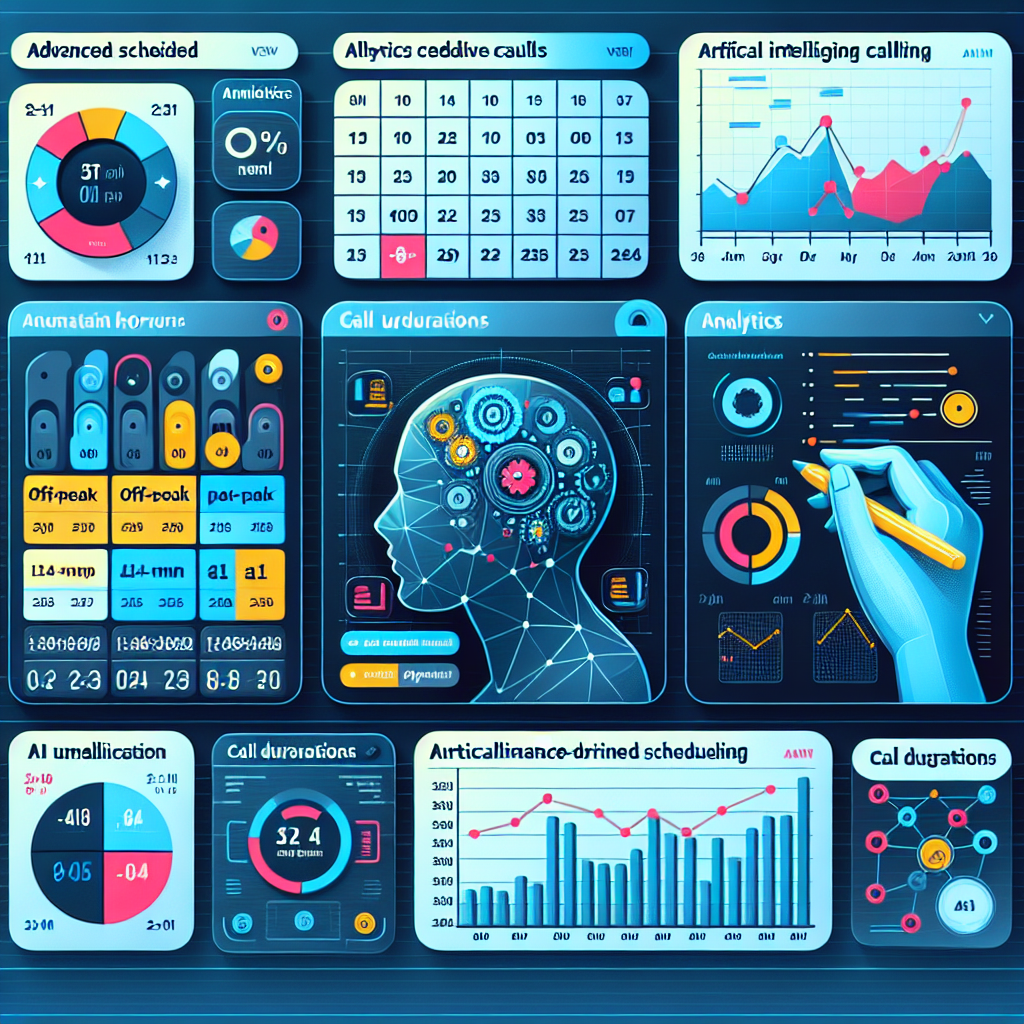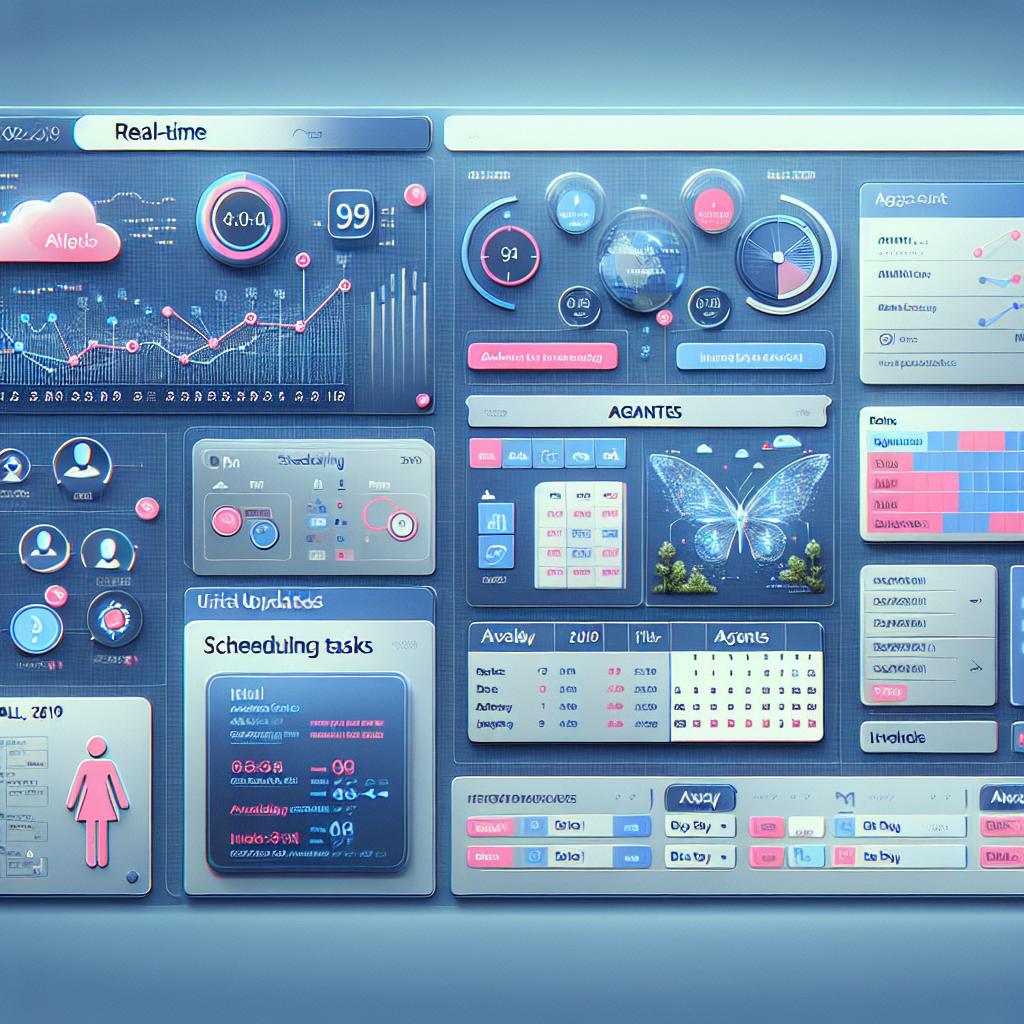
AI-Driven call scheduling is becoming increasingly integral for businesses to optimize both agent availability and customer convenience. This technology uses artificial intelligence to manage customer interactions, streamline business operations, and free human resources for more complex tasks.
The foundation of AI call scheduling is to ensure seamless communication between businesses and their customers. It employs a deep learning algorithm to recognize patterns in customer interaction, which helps make efficient placement of calls. By accurately predicting the best time to contact customers, businesses can significantly increase the success rate of call completion.

Beyond just call scheduling, AI can improve call quality even further by analyzing conversational data to understand customer feedback better. Combining these capabilities results in a streamlined communication channel, reduced operational cost, and improved customer satisfaction – a triad that is critical to achieving significant business growth.
With AI-driven call scheduling, there's no more guesswork or missed opportunities due to time zone differences or unavailability. The AI system can manage multiple time zones and customer engagements, ensuring every engagement is personalized and timely. Ultimately, this technology increases the efficiency of the customer service team and enables them to manage calls more effectively.
Invariably, AI-Driven Call Scheduling equips businesses with a tool to leverage the patterns and behavior of their customers, thereby improving the rate of successful interactions and boosting customer satisfaction levels.
Overall, adopting AI-supported call scheduling is essential for businesses striving to stand out in today's increasingly competitive market. The benefits it provides are simply unmatched, offering the potential to revolutionize customer-service interactions, streamline operations, and lead to significant savings in terms of time and money.
As enterprise ecosystems become increasingly complex, there is a growing need for effective solutions that streamline the call scheduling process for improved agent availability and overall customer convenience. Thanks to the game-changing advancements in Artificial Intelligence (AI), integrating AI-driven call scheduling solutions with existing infrastructure is now a viable and highly beneficial strategy. The beauty of AI tools is that they can be seamlessly merged into the current systems, reducing downtime, enhancing efficiency, and ensuring the smooth operation of customer relationship management (CRM).
The primary step in integrating AI with existing infrastructure involves identifying the existing tool features that overlap with the new AI solutions. This is done to avoid redundancy and confusion. Once this is outlined, the process of incorporating AI in call scheduling becomes much simpler. AI solutions use advanced algorithms to automate the scheduling process, seamlessly allocating calls to available agents. In addition, these AI solutions can analyze call patterns and predict call volume, enabling proactive scheduling of agents. This improved allocation and scheduling not only optimize agent availability but also enhance customer satisfaction.
Today, many AI call scheduling solutions available in the market come with versatile API options that allow them to fit easily into any existing CRM system. Besides, since AI tools rely on machine learning, they continually learn and adapt to your organization's unique call scheduling needs, thereby increasing their accuracy and effectiveness over time.
In conclusion, the integration of AI-driven call scheduling solutions with existing infrastructure is a revolutionary step in modernizing call centers. It's a proven strategy for optimizing agent availability, making call scheduling more efficient, and significantly improving customer service. Thus, the integration of AI solutions is undeniably a win-win for both businesses and their customers.
In our technology-driven world, real-time scheduling, facilitated by advanced AI algorithms, is fundamentally transforming customer engagement paradigms and agent availability management in call centers. Customers no longer want to wait around for businesses to call back at their convenience or change their schedules, they demand more control and want real-time updates. Luckily, AI-driven call scheduling platforms are coming to the rescue.

Using the power of artificial intelligence, call scheduling platforms can handle real-time changes efficiently. Whether its cancellations, reschedules or the addition of new appointments, AI systems are capable of managing these alterations almost instantaneously. They optimize schedules by smartly filling gaps left by cancellations, preventing overbooking and thus effectively maximizing agent availability.
Additionally, AI-driven call scheduling systems learn patterns over time; they can predict common times for cancellations or no-shows, and adjust scheduling accordingly to further optimize agent productivity. This feature alone greatly contributes to increasing the overall service efficiency of call centers.
With the ability to handle real-time data, AI call scheduling systems ensure exceptional customer convenience. Customers receive immediate notifications of changes and can access real-time agent availability. They can easily self-schedule or reschedule appointments, creating an effortless experience that heightens customer satisfaction and builds loyalty.
In conclusion, AI-driven call scheduling is shaping the future of customer interaction in call centers, making it more efficient, personable and customer-oriented. It's high time to adapt AI technology and embrace its full potential.
In today's competetive world, customer experience stands paramount. One major improvement brought in by AI-driven call scheduling is a significant enhancement in the overall customer experience. It's no less than a revolution in optimizing both agent availability and customer convenience. There are various ways AI has been contributing to this endeavor, let's discuss some of them.
Foremost, reducing customer wait times has been a constant challenge. Now, with the implementation of AI in operations, businesses are able to solve this issue seamlessly. AI-powered systems are capable of predicting agent availability, thereby ensuring that customers don't have to wait unnecessarily. This leads to improved customer satisfaction and boosted brand loyalty.
Further, automated rescheduling is another advantage brought in by AI technology. In case of any sudden cancellations or changes, AI-driven systems can automatically reschedule the call with the agent, thus saving significant time for both the parties. This not only provides convenience to the customers but also increases the efficiency of the agents.
Lastly, the ability of AI to provide convenient scheduling options can't be overlooked. With AI-driven call scheduling, customers gain the freedom to choose their preferred time slots for calls. This level of flexibility greatly enhances the customer's experience with the business. An in-depth study on how AI provides convenient scheduling options can be found here.
In conclusion, the smart integration of technology, particularly the use of AI in call scheduling, is proving to be a game-changer. By significantly optimizing agent availability and customer convenience, it is contributing greatly to enhanced customer experience. To prosper in this fiercely competitive business landscape, embracing such AI-driven technologies is no longer optional, but a necessity.
As we progress towards an era of artificial intelligence and automation, businesses have begun incorporating AI-driven call scheduling systems into their communication strategies. In the following case studies, we delve into the realm of AI call scheduling and its promising outcomes.
One exceptional success story comes from the telecommunications industry. For example, Vonage, a cloud communications provider, has revolutionized its call service with AI-driven scheduling. By predicting peak call times and scheduling agents effectively, Vonage has seen a significant increase in customer satisfaction and operational efficiency. Salesforce, the CRM giant, observed a 35% increase in agent productivity upon integrating AI-powered call scheduling capabilities.
A similar success story unfolds in the aviation industry, where airlines have begun leveraging AI to forecast call volumes. Delta Airlines revealed that their deployment of AI-enabled call scheduling systems led to a reduction in passenger waiting times and substantially improved their customer service ratings.
Another study from the healthcare sector revealed Healthfirst, a not-for-profit health insurance company, utilized AI-driven call scheduling to promptly respond to patient inquiries. AI helped in forward scheduling, predictive call routing and preemptive outreach, resulting in over 40% reduction in call waiting times and improved patient satisfaction.
In featuring the diversity of sectors and the scope for efficiency enhancement, these case studies reveal the driving force behind AI’s potential in transforming industries. By leveraging AI technology in call scheduling, businesses can achieve exceptional levels of customer service, operational efficiency, and productivity.
Start your free trial for My AI Front Desk today, it takes minutes to setup!








